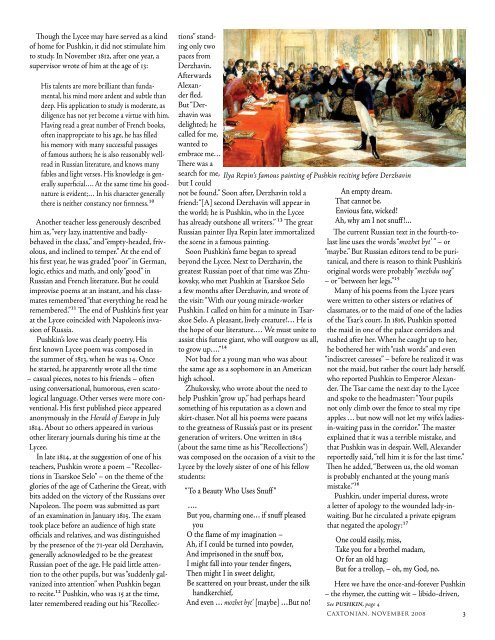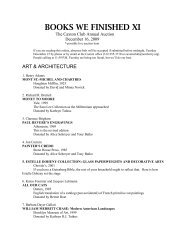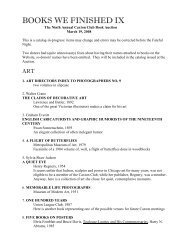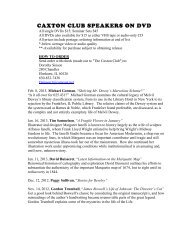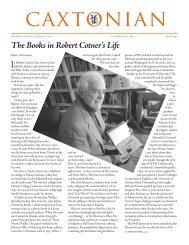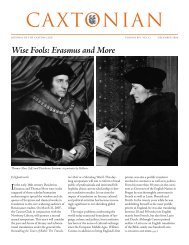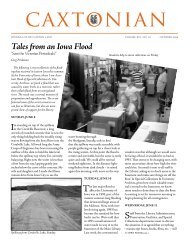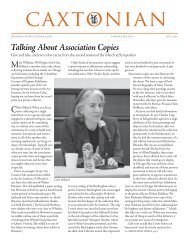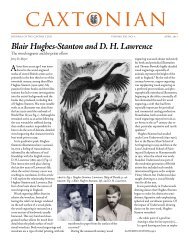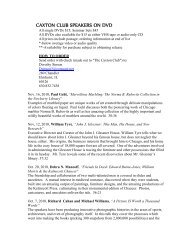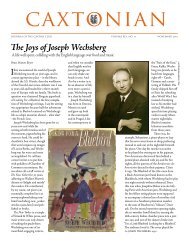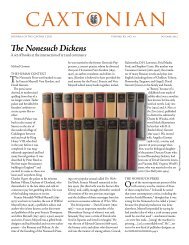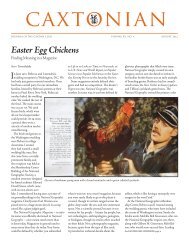Collecting Pushkin - The Caxton Club
Collecting Pushkin - The Caxton Club
Collecting Pushkin - The Caxton Club
You also want an ePaper? Increase the reach of your titles
YUMPU automatically turns print PDFs into web optimized ePapers that Google loves.
Though the Lycee may have served as a kind<br />
of home for <strong>Pushkin</strong>, it did not stimulate him<br />
to study. In November 1812, after one year, a<br />
supervisor wrote of him at the age of 13:<br />
His talents are more brilliant than fundamental,<br />
his mind more ardent and subtle than<br />
deep. His application to study is moderate, as<br />
diligence has not yet become a virtue with him.<br />
Having read a great number of French books,<br />
often inappropriate to his age, he has filled<br />
his memory with many successful passages<br />
of famous authors; he is also reasonably wellread<br />
in Russian literature, and knows many<br />
fables and light verses. His knowledge is generally<br />
superficial…. At the same time his goodnature<br />
is evident;… In his character generally<br />
there is neither constancy nor firmness.10<br />
Another teacher less generously described<br />
him as, “very lazy, inattentive and badlybehaved<br />
in the class,” and “empty-headed, frivolous,<br />
and inclined to temper.” At the end of<br />
his first year, he was graded “poor” in German,<br />
logic, ethics and math, and only “good” in<br />
Russian and French literature. But he could<br />
improvise poems at an instant, and his classmates<br />
remembered “that everything he read he<br />
remembered.”11 <strong>The</strong> end of <strong>Pushkin</strong>’s first year<br />
at the Lycee coincided with Napoleon’s invasion<br />
of Russia.<br />
<strong>Pushkin</strong>’s love was clearly poetry. His<br />
first known Lycee poem was composed in<br />
the summer of 1813, when he was 14. Once<br />
he started, he apparently wrote all the time<br />
– casual pieces, notes to his friends – often<br />
using conversational, humorous, even scatological<br />
language. Other verses were more conventional.<br />
His first published piece appeared<br />
anonymously in the Herald of Europe in July<br />
1814. About 20 others appeared in various<br />
other literary journals during his time at the<br />
Lycee.<br />
In late 1814, at the suggestion of one of his<br />
teachers, <strong>Pushkin</strong> wrote a poem – “Recollections<br />
in Tsarskoe Selo” – on the theme of the<br />
glories of the age of Catherine the Great, with<br />
bits added on the victory of the Russians over<br />
Napoleon. <strong>The</strong> poem was submitted as part<br />
of an examination in January 1815. <strong>The</strong> exam<br />
took place before an audience of high state<br />
officials and relatives, and was distinguished<br />
by the presence of the 71-year old Derzhavin,<br />
generally acknowledged to be the greatest<br />
Russian poet of the age. He paid little attention<br />
to the other pupils, but was “suddenly galvanized<br />
into attention” when <strong>Pushkin</strong> began<br />
to recite.12 <strong>Pushkin</strong>, who was 15 at the time,<br />
later remembered reading out his “Recollec-<br />
tions”standing only two<br />
paces from<br />
Derzhavin.<br />
Afterwards<br />
Alexander<br />
fled.<br />
But “Derzhavin<br />
was<br />
delighted; he<br />
called for me,<br />
wanted to<br />
embrace me…<br />
<strong>The</strong>re was a<br />
search for me,<br />
but I could<br />
not be found.” Soon after, Derzhavin told a<br />
friend: “[A] second Derzhavin will appear in<br />
the world; he is <strong>Pushkin</strong>, who in the Lycee<br />
has already outshone all writers.” 13 <strong>The</strong> great<br />
Russian painter Ilya Repin later immortalized<br />
the scene in a famous painting.<br />
Soon <strong>Pushkin</strong>’s fame began to spread<br />
beyond the Lycee. Next to Derzhavin, the<br />
greatest Russian poet of that time was Zhukovsky,<br />
who met <strong>Pushkin</strong> at Tsarskoe Selo<br />
a few months after Derzhavin, and wrote of<br />
the visit: “With our young miracle-worker<br />
<strong>Pushkin</strong>. I called on him for a minute in Tsarskoe<br />
Selo. A pleasant, lively creature!… He is<br />
the hope of our literature.… We must unite to<br />
assist this future giant, who will outgrow us all,<br />
to grow up….”14<br />
Not bad for a young man who was about<br />
the same age as a sophomore in an American<br />
high school.<br />
Zhukovsky, who wrote about the need to<br />
help <strong>Pushkin</strong> “grow up,” had perhaps heard<br />
something of his reputation as a clown and<br />
skirt-chaser. Not all his poems were paeans<br />
to the greatness of Russia’s past or its present<br />
generation of writers. One written in 1814<br />
(about the same time as his “Recollections”)<br />
was composed on the occasion of a visit to the<br />
Lycee by the lovely sister of one of his fellow<br />
students:<br />
Ilya Repin’s famous painting of <strong>Pushkin</strong> reciting before Derzhavin<br />
“To a Beauty Who Uses Snuff ”<br />
….<br />
But you, charming one… if snuff pleased<br />
you<br />
O the flame of my imagination –<br />
Ah, if I could be turned into powder,<br />
And imprisoned in the snuff box,<br />
I might fall into your tender fingers,<br />
<strong>The</strong>n might I in sweet delight,<br />
Be scattered on your breast, under the silk<br />
handkerchief,<br />
And even … mozhet byt’ [maybe] …But no!<br />
An empty dream.<br />
That cannot be.<br />
Envious fate, wicked!<br />
Ah, why am I not snuff!...<br />
<strong>The</strong> current Russian text in the fourth-tolast<br />
line uses the words “mozhet byt’ ” – or<br />
“maybe.” But Russian editors tend to be puritanical,<br />
and there is reason to think <strong>Pushkin</strong>’s<br />
original words were probably “mezhdu nog”<br />
– or “between her legs.”15<br />
Many of his poems from the Lycee years<br />
were written to other sisters or relatives of<br />
classmates, or to the maid of one of the ladies<br />
of the Tsar’s court. In 1816, <strong>Pushkin</strong> spotted<br />
the maid in one of the palace corridors and<br />
rushed after her. When he caught up to her,<br />
he bothered her with “rash words” and even<br />
“indiscreet caresses” – before he realized it was<br />
not the maid, but rather the court lady herself,<br />
who reported <strong>Pushkin</strong> to Emperor Alexander.<br />
<strong>The</strong> Tsar came the next day to the Lycee<br />
and spoke to the headmaster: “Your pupils<br />
not only climb over the fence to steal my ripe<br />
apples … but now will not let my wife’s ladiesin-waiting<br />
pass in the corridor.” <strong>The</strong> master<br />
explained that it was a terrible mistake, and<br />
that <strong>Pushkin</strong> was in despair. Well, Alexander<br />
reportedly said, “tell him it is for the last time.”<br />
<strong>The</strong>n he added, “Between us, the old woman<br />
is probably enchanted at the young man’s<br />
mistake.”16<br />
<strong>Pushkin</strong>, under imperial duress, wrote<br />
a letter of apology to the wounded lady-inwaiting.<br />
But he circulated a private epigram<br />
that negated the apology:17<br />
One could easily, miss,<br />
Take you for a brothel madam,<br />
Or for an old hag;<br />
But for a trollop, – oh, my God, no.<br />
Here we have the once-and-forever <strong>Pushkin</strong><br />
– the rhymer, the cutting wit – libido-driven,<br />
See PUSHKIN, page 4<br />
CAXTONIAN, NOVEMBER 2008 3


